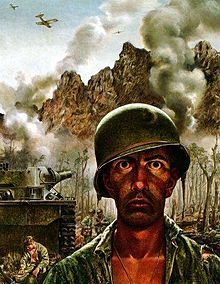
Thomas Lea / U.S. Army
I love all of the current dialogue between the American Psychiatric Association and the military. For years, they were at loggerheads, principally about the policy of not allowing gays to openly serve in the armed forces. Military psychiatrists could wear their uniform at APA events, but were often singled out for criticism over the policy. Ten years ago, prior to 9/11, many did not don their uniforms there.
Last week, at the APA’s annual meeting Philadelphia, there was a major emphasis on military mental health. At three of the workshops that I held the crowds were overflowing. They touched on very different points on the military psychiatry compass: on being a civilian contractor at a military hospital; psychological effects of the long war and strategies for mitigation; and personal reflections by psychiatrists in a combat zone. A glossy brochure announced the sessions, with a beautiful and moving photo on the cover, by my colleague Chester Simpson.
There were also talks on PTSD, of course. There was an audience for these sessions, but the crowds seemed thinner and less enthusiastic. It was clear to me that the attendees were interested in the personal experience of the psychiatrists in the war, or how to be directly involved in taking care of Soldiers and other service members.
The debate on the proper name for the symptoms of the psychological effects of combat has captured the headlines. But the larger question to me is how civilian psychiatrists and other mental health providers can aid in the re-integration of returning Soldiers.
A bit of relevant history. Institutional psychiatry was heavily involved in World War II. Dr. Karl Menninger was a major player in the effort to pre-screen Soldiers, to attempt to avoid sending sub-par recruits to war, and thereby avoiding the considerable disability payments that the nation had to make after World War I.
The Veterans Affairs administration blossomed after World War II, training psychiatrists and psychologists in combat-related psychological trauma. But returning Soldiers were treated very shabbily after the end of the Vietnam War. Shouts of “Baby killer!” greeted many vets coming back home to U.S. soil at the San Francisco airport.
PTSD was first labeled as a diagnosis in 1980. But by then many veterans not only had PTSD, but substance abuse, joblessness, and homelessness. These conditions led to the creation of the influential National Center for Post-Traumatic Stress Disorder (I will spare you the full history, but those interested can read a long-overdue chapter by Dr. Norman Camp on the experiences of Vietnam psychiatrists here).
For more history, another great book is War of Nerves, by Ben Shepard, a British journalist, which covers the last century of the relationship between psychiatrists and Soldiers, mainly from the perspective of the United Kingdom. Issues of disability and nomenclature have run throughout the last 100 years.
So, back to the present. Some of my colleagues think that it is wheel-spinning to debate (yet again) the nomenclature around PTSD. Some think—and I agree with them—that it is not the name, but the care and treatment that matter most.
But the good thing, is that we are in in together. No longer is the debate about homosexuality, now that “don’t ask don’t tell” has been repealed. Instead it is: “How can we help?”
Of course, it is not just psychiatrists, but all the mental health disciplines that want to lend a hand to returning veterans. Barbara Van Dahlen, a psychologist, has done heroic efforts with her “Give an Hour” non-profit. Joseph Borrow, another psychologist, has been a leader with the “Coming Home” retreats. Social work and occupational therapy have done yeoman’s jobs, both in and out of uniform.
Sometimes forgotten are the military psychiatrists, psychologists and social workers who have lost their lives, in combat or at the shootings at Camp Liberty and Fort Hood. These are fine men who have given their all to help their fellow Soldiers. My condolences, again, to their families.
So, in summary, I think that the emerging dialogue between former foes—the APA and the military—is extremely encouraging. It highlights that the treatment of the long-term psychological effects of war is not just a military or VA issue, it is a national one.
The nation should sign up to help.


